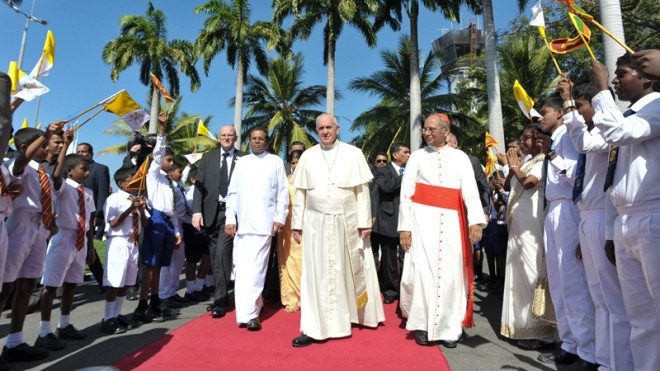Pope urges reconciliation, justice after 25-year civil war

Pope Francis, center, arrives at Colombo’s International airport, Sri Lanka, Tuesday, Jan. 13, 2015. The pontiff arrived in Sri Lanka Tuesday at the start of a weeklong Asian tour saying the island nation can’t fully heal from a quarter-century of ethnic civil war without pursuing truth for the injustices committed. (AP Photo/L’Osservatore Romano, pool)
COLOMBO, Sri Lanka—Pope Francis brought calls for reconciliation as well as justice as he arrived on Tuesday in Sri Lanka at the start of a weeklong Asian tour, saying the island nation can’t fully heal from a quarter-century of ethnic civil war without pursuing the truth about abuses that were committed.
In a show of ethnic coexistence, though, the Pope’s welcoming ceremony at Colombo’s airport featured traditional dancers and drummers from both majority Sinhalese and minority Tamil ethnic groups, as well as a children’s choir serenading him in both of Sri Lanka’s languages—as well as Italian and English.
With 40 elephants dressed in colorful costumes lining the airport road behind him, Francis said that finding true peace after so much bloodshed “can only be done by overcoming evil with good, and by cultivating those virtues which foster reconciliation, solidarity and peace.”
He didn’t specifically mention Sri Lanka’s refusal to cooperate with a UN investigation into alleged war crimes committed in the final months of the war.
But he said: “The process of healing also needs to include the pursuit of truth, not for the sake of opening old wounds, but rather as a necessary means of promoting justice, healing and unity.”
Article continues after this advertisementTamil rebels fought a 25-year civil war to demand an independent Tamil nation after decades of perceived discrimination by governments dominated by the Sinhalese majority. UN estimates say 80,000 to 100,000 people were killed during the war, though other reports suggest the toll could be much higher.
Article continues after this advertisementProbe on wartime abuses
Sri Lanka’s new president, Maithripala Sirisena, has promised to launch an inquiry into wartime abuses, but he has also pledged to protect everyone who contributed to the defeat of Tamil Tiger separatists from international legal action.
A 2011 UN report said up to 40,000 ethnic Tamil civilians may have been killed in the last months of the civil war, and accused both sides of serious human rights violations. It said the government was suspected of deliberately shelling civilians and hospitals and blocking food and medicine for civilians trapped in the war zone. The rebels were accused of recruiting child soldiers and holding civilians as human shields and firing from among them.
A few months after the UN report was released, the government of longtime President Mahinda Rajapaksa released its own Lessons Learnt and Reconciliation Commission findings, which concluded that Sri Lanka’s military didn’t intentionally target civilians at the end of the war and that ethnic rebels routinely violated international humanitarian law.
Sirisena, who was sworn in on Friday after an election upset, told Francis in the airport welcome ceremony that his government sought to promote “peace and friendship among our people after overcoming a cruel terrorist conflict.
“We are a people who believe in religious tolerance and coexistence based on our centuries-old heritage,” he said.
Tamils, however, still say they are discriminated against and human rights activists say the government isn’t serious about probing rights abuses.
‘Like Jesus Christ’
In his speech, Francis said it wasn’t enough for the government to build infrastructure and meet material needs of Sri Lanka’s people. “The great work of rebuilding,” he said, must embrace “promoting human dignity, respect for human rights and the full inclusion of each member of society.”
Thousands of people lined Francis’ 28-kilometer route from the airport, which he traveled entirely in his open-topped popemobile. While some who had staked out positions since dawn were frustrated that he sped past so quickly, Francis took so long greeting well-wishers that he canceled a meeting with Sri Lanka’s bishops in the afternoon after falling more than an hour behind schedule.
“This is like Jesus Christ Himself coming to Sri Lanka!” marveled Ranjit Solis, 60, a retired engineer. He recalled that Pope Paul VI only spent two hours in Sri Lanka in 1970, while St. John Paul II spent a day in 1975. “The current Pope is coming for three days! He serves the poor and is concerned about poor countries. It’s a great thing.”
Source of nat’l unity
Aside from the airport welcome ceremony, Francis’ other main event on Tuesday was a meeting with representatives from Sri Lanka’s main religions.
Some 70 percent of Sri Lankans are Buddhist—most from the Sinhalese ethnic group. Another 13 percent are Hindu, most of them Tamil, and some 10 percent are Muslim. Catholics make up less than 7 percent of the island nation’s 20 million people, but the Church counts both Sinhalese and Tamils as members and sees itself as a strong source for national unity.